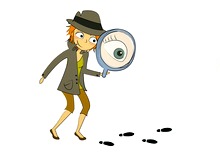| Back to Back Issues Page |
 |
|
English Detective #41, Holocaust Rescues: a Little Light in the Darkness; July 1,2014 July 01, 2014 |
A Little Light in the Darkness
I don’t think anyone enjoys thinking about the Holocaust-- the Nazi attempt to eliminate the Jewish people, almost 75 years ago now-- or the massacres and attempted genocides that have happened all too often since. Many people have studied the Holocaust, hoping that understanding its causes might help prevent such horrors in the future. They have also preserved the stories of people who worked against the forces of death-- who saw a way they could help, in the midst of helplessness and horror. The readings in this issue tell of a few people who did what they could: a British stockbroker who arranged transportation for many Jewish Czech children out of refugee camps (that would soon lead to concentration camps) to foster homes in Britain, and hundreds of ordinary Danes who smuggled their Jewish neighbors to safety in Sweden. Many of the stories are suitable for middle or high school students, even with limited English. (See the descriptions below.) There is also some discussion and practice with vocabulary from the readings, immediately below. 
Word Clues: This Issue’s Vocabulary:
code, decode, holocaust, refugee, rescue, transport Notice how these words are used in the readings and practice activities. Then try to use some of them yourself, in a sentence or two. Word Clue Notes and Practice:
Code and transport are review words from the Academic Word List. Code, rescue, and transport can be used as either nouns or verbs. A code can be a group of rules or laws. (A city’s building code lists rules builders must follow. The Code of Hammurabi was one of the first organized systems of laws.) A code can also be a system of letters, numbers, symbols, or signals to send messages, often secretly. Computer programming is written in code. At its most basic it is a sequence of 1s and 0s that tell the computer what to do. To code is to write a message in some kind of code, whether for a computer or for secrecy. Decoding is figuring out the coded message. The Holocaust refers to the millions of Jews killed by the Nazis during World War 2. A refugee is a person who needs to escape from his or her home area. (The root ‘fug’ means to flee or escape.) Refugees seek refuge or asylum-- a safe place to stay until they can return home (if they ever can.) To rescue means to save someone from danger. The stories linked below tell how ordinary people found ways to rescue Jewish children and adults before they were sent to concentration camps-- and probable death. To transport means to move things or people from one place to another. (The root ‘port’ means to carry.) Practice different forms of these, and related, words by choosing from the list below to fill in the blanks in the next paragraph. (Answers are below “Coming in the next issue.) decoded, fugitives, imported, porters, refuge, transportation Who would have guessed that the _________ who carried the products ________ from Europe off the ship and into waiting trucks were criminals? They were _________ from justice who had escaped from their countries just before the police caught them, and found ________ in the _________ industry, moving items from the boats to trucks that would carry the products across the country. Police here would never have caught them except that a detective ________ one of their secret messages to their crime boss. You can learn more vocabulary related to violence, if you need it, here. Getting the whole story: reading/listening practice:
This is the story of British stockbroker Nicholas Winton.When he understood the danger to Jewish children after the Germans took over part of Czechoslovakia, he worked tirelessly to arrange transportation and temporary homes for them in Great Britain. My first choice for students (short, fairly simple narratives and a positive outcome) would probably be its link to a Copenhagen site (in English-- below the navigation info) on the Danish Jews’ escape to Sweden and especially very short stories about the secret codes rescuers used: ”The Code is Apple Crates.” If you have time, there’s a link at the bottom of that page to another true short story about the way Danish Social Services protected Jewish property until its owners could return. __________________________________
|
| Back to Back Issues Page |